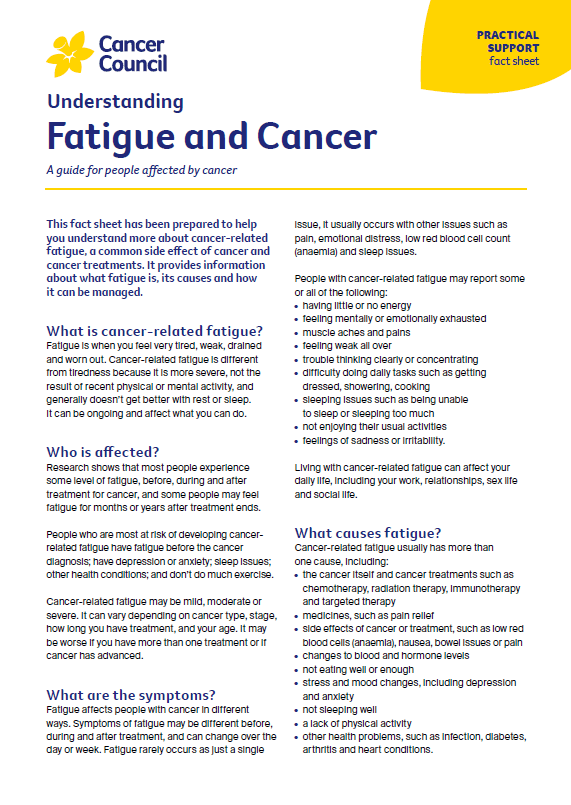Fatigue
It is common to feel tired during and after treatment, and to lack energy for day-to-day activities. Fatigue for people with cancer is different from tiredness, as it may not go away with rest or sleep. You may lose interest in things that you usually enjoy doing or feel unable to concentrate for very long.
If fatigue is a problem, talk to your treatment team. Sometimes fatigue can be caused by a low red blood cell count (anaemia) or the side effects of drugs, and can be treated. While you can’t always avoid fatigue, you can find ways to improve your energy levels.
Learn more about fatigue and cancer and listen to our podcast on fatigue below.
Managing fatigue
- Set small, manageable goals for the day, and rest before you get too tired.
- Plan breaks throughout the day when you are completely still for a while. An eye pillow can help at these times.
- Ask for and accept offers of help with tasks such as shopping, cleaning and gardening.
- Say no to things you really don’t feel like doing.
- Leave plenty of time to get to appointments.
- Sit down whenever you can.
- Ask your doctor what sort of exercise would be suitable. Even a walk around the garden or block can boost your energy levels.
- Eat nutritious food to keep your energy levels up.
- Consider acupuncture – some people find it helps with fatigue.
→ READ MORE: Getting a better night’s sleep
Podcast: Managing Cancer Fatigue
Listen to more of our podcast for people affected by cancer
More resources
All updated content has been clinically reviewed by A/Prof Anthony Linton, Medical Oncologist, Concord Cancer Centre and Concord Repatriation General Hospital, NSW; Dr Naveed Alam, Thoracic Surgeon, St Vincent’s Private Hospital Melbourne and Monash Medical Centre, VIC; Prof David Morris, Peritonectomy Surgeon, St George Hospital and UNSW, NSW. This edition is based on the previous edition, which was reviewed by the following panel: A/Prof Anthony Linton (see above); Dr Naveed Alam, (see above); Donatella Arnoldo, Consumer; Polly Baldwin, 13 11 20 Consultant, Cancer Council SA; Dr Melvin (Wee Loong) Chin, Medical Oncologist, Sir Charles Gairdner Hospital and National Centre for Asbestos Related Diseases, WA; Prof Kwun Fong, Thoracic and Sleep Physician and Director, UQ Thoracic Research Centre, The Prince Charles Hospital, and Professor of Medicine, The University of Queensland, QLD; Vicki Hamilton OAM, Consumer and CEO, Asbestos Council of Victoria/ GARDS Inc., VIC; Dr Susan Harden, Radiation Oncologist, Peter MacCallum Cancer Centre, VIC; Penny Jacomos, Social Worker, Asbestos Diseases Society of South Australia, SA; Prof Brian Le, Director, Parkville Integrated Palliative Care Service, The Royal Melbourne Hospital and Peter MacCallum Cancer Centre, VIC; Lung Cancer Support Nurses, Lung Foundation Australia; Jocelyn McLean, Mesothelioma Support Coordinator, Asbestos Diseases Research Institute, NSW; Prof David Morris (see above); Joanne Oates, Registered Occupational Therapist, Expert Witness in Dust Diseases, and Director, Evaluate, NSW; Chris Sheppard and Adam Barlow, RMB Lawyers.
View the Cancer Council NSW editorial policy.
View all publications or call 13 11 20 for free printed copies.

